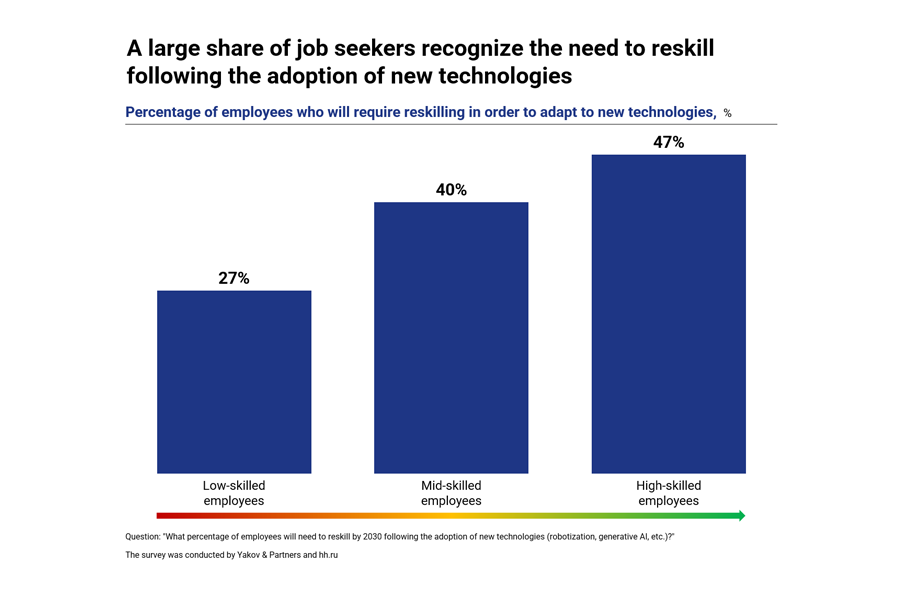Continuous learning, the hybrid work format, and increasing demands for better working conditions are three major trends that will shape the future of the Russian labor market until 2030, according to employees and job seekers. These were the conclusions drawn by experts from Yakov & Partners and HeadHunter (hh.ru), the largest online recruitment platform in Russia, based on their joint survey titled "The Impact of Social Trends on the Labor Market."
Seventy-five percent of respondents anticipate that continuous learning will be the most significant trend in the labor market in the next seven years. When discussing the skill sets that require upgrading, 57% of participants mentioned hard skills such as foreign languages, software proficiency, mathematics, geology, and engineering. While a vast majority expressed openness to learning (96% of job seekers are already training and developing their skills¹), only 15% of respondents said they were willing to undergo complete reskilling independently. Most job seekers expect support from their employers in this regard.
Several factors have driven the prioritization of skill development in the job market, making it one of the top long-term trends. The accelerated transformation of the economy and the rapidly changing environment that businesses need to respond to have played a major role in this shift. Companies are facing new challenges and opportunities, and the traditional approach we discussed is no longer sufficient to attract talented candidates who can quickly adapt to changing realities. As new types of jobs continue to emerge, they require specific skills that may not be adequately addressed by educational institutions that are facing challenges in adapting to the BANI economy. A skills-based approach helps attract the best candidates based on skills and then further develop and retain them within the company. This approach allows businesses to adapt more quickly and effectively to an ever-changing environment. Globally, we are witnessing a growing culture of innovation and startups driven by technological advancements. As a result, priorities in the job market are shifting towards employees' ability to learn quickly, grasp the situation, adapt, and think outside the box. In this context, focusing on skills becomes crucial for businesses to thrive.
It is noteworthy that respondents believe highly skilled employees to be 1.7 times more likely to join a reskilling program compared to low-skilled workers.
It is true that high-skilled employees tend to be more engaged in continuous learning. However, it is generally the mid-skilled workers who require the most reskilling, as they are in high demand in today's reality.
In many industries, such as business services, mass media, marketing, advertising, BTL, PR, design, production, information technology, system integration, and the Internet, most companies already operate in a hybrid format, combining office and remote work. According to respondents, between 50% and 100% of their peers from these sectors have already transitioned to hybrid work. On the other hand, government agencies have the lowest penetration of the hybrid format – 87% of respondents shared that less than 10% of their colleagues are known to be working under this arrangement.
Over a third of respondents anticipate an increase in the number of employees working in a hybrid format. That said, nearly half of the participants believe that the hybrid work format positively impacts staff efficiency. Among different departments, marketing (66%) and sales and service employees (65%) share the highest belief in efficiency gains
The post-COVID situation has demonstrated the viability and sustainability of hybrid work. It provides necessary flexibility for employees seeking self-development or a better work-life balance. Over a third of respondents predict an increase in the percentage of employees working in a hybrid format by 2030, and 44% expect hybrid or remote work options to become an important part of employee benefits. In this context, companies that have embraced this employment format will have an advantage over those who have taken a more inflexible stance.
Another trend highlighted by job seekers is the shortened workweek and shorter workday. Currently, only 7% and 10% of companies are exploring this opportunity, but approximately half of the respondents who have already experienced this format report an increase in their efficiency.
Interestingly, despite the global aging population trend, which is also significant in Russia, three-fourths of the respondents believe that their companies are not taking any action to address this trend.
According to the respondents, our companies' attitudes towards hiring older employees are negative rather than neutral or positive, despite the fact that globally, the older generation is increasingly involved in the workforce. However, in industries and fields that are already experiencing a shortage of staff, attracting and retaining senior employees can be one of the most essential resources.
The study also examines other trends, such as the growing number of skilled migrants, the elimination of gender inequality, and the increase in benefits for special groups of people. The survey involved 1,500 employees and job seekers.
1 https://yakov.partners/publications/u-turn-in-the-labor-market




